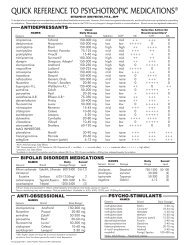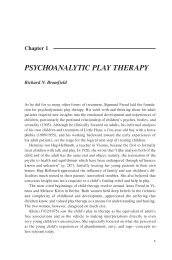IRAQ WAR CLINICIAN GUIDE
Iraq War Clinician's Guide - Network Of Care
Iraq War Clinician's Guide - Network Of Care
You also want an ePaper? Increase the reach of your titles
YUMPU automatically turns print PDFs into web optimized ePapers that Google loves.
Iraq War Clinician Guide<br />
- -<br />
72 Assessment and Treatment of Anger<br />
- P<br />
anger expression style is learned, and the skills required to alter anger patterns will take time to<br />
master.<br />
Several psychiatric problems tend to be highly comorbid with PTSD, such as depression and<br />
substance abuse. These problems also pose potential barriers for effective treatment of anger<br />
problems among those with PTSD. In addition, veterans with PTSD are more likely to suffer from<br />
physical health problems, and often suffer from severe social and occupational impairments. These<br />
factors serve to increase stress and ameliorate emotional and tangible resources for the veteran,<br />
placing him or her at additional risk for anger dysregulation and violence perpetration. Further,<br />
these factors may lead to a reduced ability to make use of treatment for anger problems. The<br />
veteran's capacity to marshal the cognitive resources to do the work of therapy (e.g., participate in<br />
self-monitoring exercises or practice communication skills) and to comply with the demands of<br />
treatment may be compromised. The treatment provider, therefore, must fully assess for comorbid<br />
problems and their impact on both the veteran's anger and his or her compliance with therapy,<br />
and should ensure that the veteran receives appropriate treatment for comorbid problems. For<br />
example, substance abuse must be addressed due to its disinhibiting effects with respect to anger<br />
and aggression.<br />
Anger Management Intervention<br />
Most PTSD treatment programs recommend and offer varied modalities and formats for the<br />
treatment of anger problems among veterans. Programs typically offer individual and group<br />
therapies, and cognitive-behavioral treatments for anger appear to be the most common.<br />
Increasingly, PTSD programs are utilizing manualized or standardized group treatments for anger<br />
treatment, and there is some research evidence for the effectiveness of such treatments (Chemtob,<br />
Novaco, Hamada, & Gross, 1997). Below, we briefly outline session content derived from a 12-<br />
week standardized cognitive behavioral group treatment for anger among veterans with PTSD.<br />
Although this material derives from a group treatment approach, the issues raised are relevant for<br />
other therapy formats and modalities.<br />
Overview of the treatment. The goal of our anger management group is for veterans to learn to<br />
understand and to better regulate their anger responses through greater awareness of their anger<br />
triggers and an application of constructive anger management strategies. Additionally, veteran's<br />
appraisals of threat in their environment and daily experience of anger are targeted as they learn to<br />
prepare back-up responses (e.g., timeouts, relaxation, cognitive restructuring, ventilation, and<br />
positive distraction). Each session consists of group discussions and skills-building exercises. We<br />
have found that each group of veterans will present with special needs and the sessions should be<br />
adapted accordingly. Group leaders vary their coverage of the material to best complement the<br />
unique needs of their group, and make efforts to encourage group cohesion and a safe and<br />
supportive group atmosphere.<br />
The first two sessions of group are devoted to orienting the veterans to treatment, discussing<br />
treatment goals and expectations of therapy, enhancing motivation to work on anger management,<br />
and providing psychoeducation on the anger response and the impact of PTSD on anger. Sessions<br />
3 through 7 are devoted to self-monitoring exercises so that the veteran may better understand his<br />
or her anger response, developing an understanding of the distinction between different forms of<br />
anger expression, learning to use relaxation strategies for managing anger, and exploring<br />
motivational issues that may be impeding progress. The remaining sessions focus on<br />
DEPARTMENT OF VETERANS AFFAIRS<br />
-<br />
NATIONAL CENTER FOR PTSD




